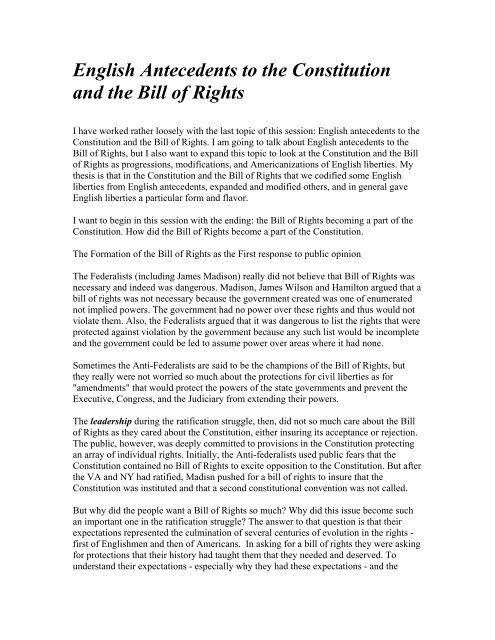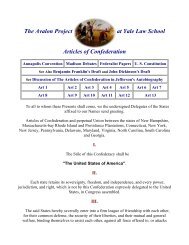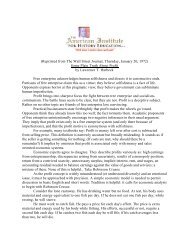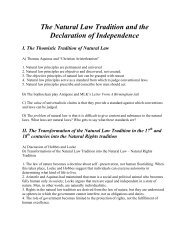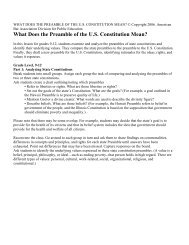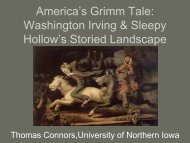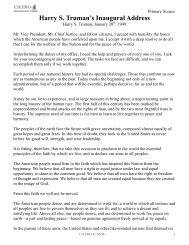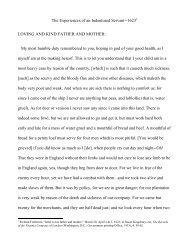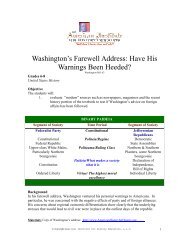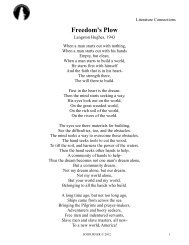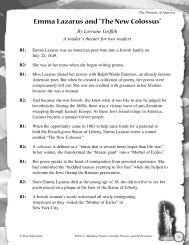English Antecedents to the Constitution and the Bill of Rights
English Antecedents to the Constitution and the Bill of Rights
English Antecedents to the Constitution and the Bill of Rights
- No tags were found...
You also want an ePaper? Increase the reach of your titles
YUMPU automatically turns print PDFs into web optimized ePapers that Google loves.
<strong>English</strong> <strong>Antecedents</strong> <strong>to</strong> <strong>the</strong> <strong>Constitution</strong><strong>and</strong> <strong>the</strong> <strong>Bill</strong> <strong>of</strong> <strong>Rights</strong>I have worked ra<strong>the</strong>r loosely with <strong>the</strong> last <strong>to</strong>pic <strong>of</strong> this session: <strong>English</strong> antecedents <strong>to</strong> <strong>the</strong><strong>Constitution</strong> <strong>and</strong> <strong>the</strong> <strong>Bill</strong> <strong>of</strong> <strong>Rights</strong>. I am going <strong>to</strong> talk about <strong>English</strong> antecedents <strong>to</strong> <strong>the</strong><strong>Bill</strong> <strong>of</strong> <strong>Rights</strong>, but I also want <strong>to</strong> exp<strong>and</strong> this <strong>to</strong>pic <strong>to</strong> look at <strong>the</strong> <strong>Constitution</strong> <strong>and</strong> <strong>the</strong> <strong>Bill</strong><strong>of</strong> <strong>Rights</strong> as progressions, modifications, <strong>and</strong> Americanizations <strong>of</strong> <strong>English</strong> liberties. My<strong>the</strong>sis is that in <strong>the</strong> <strong>Constitution</strong> <strong>and</strong> <strong>the</strong> <strong>Bill</strong> <strong>of</strong> <strong>Rights</strong> that we codified some <strong>English</strong>liberties from <strong>English</strong> antecedents, exp<strong>and</strong>ed <strong>and</strong> modified o<strong>the</strong>rs, <strong>and</strong> in general gave<strong>English</strong> liberties a particular form <strong>and</strong> flavor.I want <strong>to</strong> begin in this session with <strong>the</strong> ending: <strong>the</strong> <strong>Bill</strong> <strong>of</strong> <strong>Rights</strong> becoming a part <strong>of</strong> <strong>the</strong><strong>Constitution</strong>. How did <strong>the</strong> <strong>Bill</strong> <strong>of</strong> <strong>Rights</strong> become a part <strong>of</strong> <strong>the</strong> <strong>Constitution</strong>.The Formation <strong>of</strong> <strong>the</strong> <strong>Bill</strong> <strong>of</strong> <strong>Rights</strong> as <strong>the</strong> First response <strong>to</strong> public opinionThe Federalists (including James Madison) really did not believe that <strong>Bill</strong> <strong>of</strong> <strong>Rights</strong> wasnecessary <strong>and</strong> indeed was dangerous. Madison, James Wilson <strong>and</strong> Hamil<strong>to</strong>n argued that abill <strong>of</strong> rights was not necessary because <strong>the</strong> government created was one <strong>of</strong> enumeratednot implied powers. The government had no power over <strong>the</strong>se rights <strong>and</strong> thus would notviolate <strong>the</strong>m. Also, <strong>the</strong> Federalists argued that it was dangerous <strong>to</strong> list <strong>the</strong> rights that wereprotected against violation by <strong>the</strong> government because any such list would be incomplete<strong>and</strong> <strong>the</strong> government could be led <strong>to</strong> assume power over areas where it had none.Sometimes <strong>the</strong> Anti-Federalists are said <strong>to</strong> be <strong>the</strong> champions <strong>of</strong> <strong>the</strong> <strong>Bill</strong> <strong>of</strong> <strong>Rights</strong>, but<strong>the</strong>y really were not worried so much about <strong>the</strong> protections for civil liberties as for"amendments" that would protect <strong>the</strong> powers <strong>of</strong> <strong>the</strong> state governments <strong>and</strong> prevent <strong>the</strong>Executive, Congress, <strong>and</strong> <strong>the</strong> Judiciary from extending <strong>the</strong>ir powers.The leadership during <strong>the</strong> ratification struggle, <strong>the</strong>n, did not so much care about <strong>the</strong> <strong>Bill</strong><strong>of</strong> <strong>Rights</strong> as <strong>the</strong>y cared about <strong>the</strong> <strong>Constitution</strong>, ei<strong>the</strong>r insuring its acceptance or rejection.The public, however, was deeply committed <strong>to</strong> provisions in <strong>the</strong> <strong>Constitution</strong> protectingan array <strong>of</strong> individual rights. Initially, <strong>the</strong> Anti-federalists used public fears that <strong>the</strong><strong>Constitution</strong> contained no <strong>Bill</strong> <strong>of</strong> <strong>Rights</strong> <strong>to</strong> excite opposition <strong>to</strong> <strong>the</strong> <strong>Constitution</strong>. But after<strong>the</strong> VA <strong>and</strong> NY had ratified, Madisn pushed for a bill <strong>of</strong> rights <strong>to</strong> insure that <strong>the</strong><strong>Constitution</strong> was instituted <strong>and</strong> that a second constitutional convention was not called.But why did <strong>the</strong> people want a <strong>Bill</strong> <strong>of</strong> <strong>Rights</strong> so much? Why did this issue become suchan important one in <strong>the</strong> ratification struggle? The answer <strong>to</strong> that question is that <strong>the</strong>irexpectations represented <strong>the</strong> culmination <strong>of</strong> several centuries <strong>of</strong> evolution in <strong>the</strong> rights -first <strong>of</strong> <strong>English</strong>men <strong>and</strong> <strong>the</strong>n <strong>of</strong> Americans. In asking for a bill <strong>of</strong> rights <strong>the</strong>y were askingfor protections that <strong>the</strong>ir his<strong>to</strong>ry had taught <strong>the</strong>m that <strong>the</strong>y needed <strong>and</strong> deserved. Tounderst<strong>and</strong> <strong>the</strong>ir expectations - especially why <strong>the</strong>y had <strong>the</strong>se expectations - <strong>and</strong> <strong>the</strong>
2rights that were eventually included in <strong>the</strong> <strong>Constitution</strong> <strong>and</strong> <strong>the</strong> <strong>Bill</strong> <strong>of</strong> <strong>Rights</strong> we have <strong>to</strong>go back <strong>to</strong> a series <strong>of</strong> documents that perserved liberties from <strong>the</strong> 13th century on:Americans drew inspiration from <strong>and</strong> looked <strong>to</strong> two <strong>English</strong> documents in particular (<strong>the</strong>Magna Carta <strong>and</strong> <strong>the</strong> <strong>English</strong> <strong>Bill</strong> <strong>of</strong> <strong>Rights</strong>), <strong>the</strong>y looked <strong>and</strong> t colonial charters (which<strong>of</strong> course are also "<strong>English</strong> antecedents"), <strong>and</strong> <strong>the</strong> state bills <strong>of</strong> rights <strong>to</strong> shape <strong>the</strong>substance <strong>and</strong> form <strong>of</strong> <strong>the</strong> <strong>Bill</strong> <strong>of</strong> <strong>Rights</strong>.These are <strong>the</strong> <strong>English</strong> <strong>Antecedents</strong> <strong>to</strong> <strong>Constitution</strong> <strong>and</strong> <strong>the</strong> <strong>Bill</strong> <strong>of</strong> <strong>Rights</strong>1. Magna Carta ("The Great Charter") - First passed in 1215, <strong>the</strong> Magna Carta is <strong>the</strong> mostsignificant <strong>of</strong> <strong>the</strong> documents in early <strong>English</strong> his<strong>to</strong>ry that contributed <strong>to</strong> <strong>the</strong> his<strong>to</strong>ricalprocess that established constitutional rights <strong>and</strong> <strong>the</strong> rule <strong>of</strong> law. The Magna Cartaoriginally arose as a means <strong>of</strong> settling disputes between Pope Innocent III, King John,<strong>and</strong> his barons about <strong>the</strong> extent <strong>of</strong> monarchial authority <strong>and</strong> <strong>the</strong> obligations owed <strong>to</strong>nobles. King John was a weak <strong>and</strong> disrespected King whose right <strong>to</strong> <strong>the</strong> throne wascontested. Acting against King John, his barons <strong>to</strong>ok London by force <strong>and</strong> forced KingJohn <strong>to</strong> sign <strong>the</strong> agreement that eventually became known as Magna Carta. Section 61 <strong>of</strong>this Magna Carta - known as <strong>the</strong> "security clause" - established a committee <strong>of</strong> 25 baronswho were given <strong>the</strong> power <strong>to</strong> meet <strong>and</strong> overrule <strong>the</strong> King <strong>and</strong> <strong>to</strong> seize his castles <strong>and</strong>takes his possessions.After signing this document under duress, King John immediately recanted <strong>and</strong> plunged<strong>the</strong> nation in<strong>to</strong> Civil War. But he <strong>the</strong>n promptly died. His nine year old son was <strong>the</strong> heir<strong>to</strong> <strong>the</strong> throne <strong>and</strong> Henry III's regents had him resign <strong>the</strong> Magna Carta with section 61ommitted. Magna Carta was actually signed in 1216, 1217, <strong>and</strong> 1225.If you read Magna Carta <strong>to</strong>day - especially if you do not have a solid underst<strong>and</strong>ing <strong>of</strong><strong>English</strong> his<strong>to</strong>ry - you will be perplexed by its significance. it is mostly a combination <strong>of</strong>feudal rights <strong>and</strong> obligations, specifying liberties for <strong>English</strong> Barons, not ordinary<strong>English</strong>men. But it also contains a series <strong>of</strong> judicial rights that allowed for a fixed court,held that fines should be proportionate <strong>to</strong> <strong>the</strong> <strong>of</strong>fense, <strong>and</strong> that people should be tried by<strong>the</strong>ir peers. In general, Magna Carta required that <strong>the</strong> King respect certain legalprocedures <strong>and</strong> accept that <strong>the</strong> will <strong>of</strong> <strong>the</strong> King could be bound by law. Magna Carta thusrepresents a prominent step <strong>to</strong>ward limited, constitutional monarchy <strong>and</strong> <strong>the</strong> rule <strong>of</strong> lawover <strong>the</strong> rule <strong>of</strong> men. Magna Carta became retrospectively important <strong>to</strong> later generations<strong>of</strong> <strong>English</strong>men <strong>and</strong> Americans as a charter <strong>of</strong> liberty.2. <strong>English</strong> <strong>Bill</strong> <strong>of</strong> <strong>Rights</strong> - A second important document in <strong>the</strong> evolution <strong>of</strong> liberty<strong>to</strong>ward <strong>the</strong> underst<strong>and</strong>ing set forth in <strong>the</strong> <strong>Bill</strong> <strong>of</strong> <strong>Rights</strong> is <strong>the</strong> <strong>English</strong> <strong>Bill</strong> <strong>of</strong> <strong>Rights</strong>. The<strong>English</strong> <strong>Bill</strong> <strong>of</strong> <strong>Rights</strong> was <strong>the</strong> culmination <strong>of</strong> <strong>the</strong> Glorious Revolution that led <strong>to</strong> <strong>the</strong>ascendancy <strong>of</strong> William <strong>and</strong> Mary <strong>to</strong> <strong>the</strong> throne. William <strong>of</strong> Orange l<strong>and</strong>ed with his armyin Engl<strong>and</strong> on 5 November1688. After defeating James II, William was <strong>of</strong>fered <strong>the</strong>throne with Mary in April 1689. They agreed <strong>to</strong> <strong>the</strong> Declaration <strong>of</strong> Right, which was <strong>the</strong><strong>English</strong> <strong>Bill</strong> <strong>of</strong> <strong>Rights</strong>, as a condition <strong>of</strong> accepting <strong>the</strong> throne.
3The <strong>English</strong> <strong>Bill</strong> <strong>of</strong> <strong>Rights</strong> is a basic document <strong>of</strong> <strong>English</strong> liberties <strong>and</strong> <strong>English</strong>constitutional law. It provides for a long list <strong>of</strong> positive rights that citizens ought <strong>to</strong> have<strong>and</strong> it requires that actions <strong>of</strong> <strong>the</strong> Crown receive <strong>the</strong> consent <strong>of</strong> <strong>the</strong> governed asrepresented in Parliament. It was thus a list <strong>of</strong> specific individual rights <strong>and</strong> a statementabout <strong>the</strong> collective rights <strong>of</strong> <strong>English</strong>men as represented in <strong>the</strong>ir Parliament.The <strong>English</strong> <strong>Bill</strong> <strong>of</strong> <strong>Rights</strong> possessed certain immutable civil <strong>and</strong> political rights. TheKing was forbidden from establishing his own courts or acting as a judge himself.Freedoms from taxation without agreement by Parliament. Freedom <strong>to</strong> petition <strong>the</strong> King.Freedom from a st<strong>and</strong>ing army in a time <strong>of</strong> peace unless Parliament agreed. Freedom forProtestants <strong>to</strong> have arms for defense. Freedom <strong>of</strong> Speech in Parliament - not questionedoutside <strong>of</strong> parliament for what <strong>the</strong>y said inside it. (Article I, Section 6 <strong>of</strong> <strong>the</strong> <strong>Constitution</strong>:"They shall in all cases except treason, felony, <strong>and</strong> breach <strong>of</strong> <strong>the</strong> peace be priviledgedfrom arrest during <strong>the</strong>ir attendance at <strong>the</strong> session <strong>of</strong> <strong>the</strong>ir respective Houses, <strong>and</strong> in going<strong>to</strong> <strong>and</strong> returning from <strong>the</strong> same; <strong>and</strong> for any speech <strong>and</strong> debate in ei<strong>the</strong>r House, <strong>the</strong>y shallnot be questioned in any o<strong>the</strong>r place." Freedom from cruel <strong>and</strong> unusual punishments <strong>and</strong>excessive bail. Freedom from fines <strong>and</strong> forteitures without trial.3. Colonial Charters: A final <strong>English</strong> antecedent <strong>to</strong> <strong>the</strong> <strong>Bill</strong> <strong>of</strong> <strong>Rights</strong> was <strong>the</strong> colonialcharters that Americans fashioned as <strong>the</strong>y settled <strong>the</strong> new world. Some examples include"<strong>the</strong> Massachusetts Body <strong>of</strong> Liberties"4. The most important antecedent <strong>to</strong> <strong>the</strong> <strong>Bill</strong> <strong>of</strong> <strong>Rights</strong> was <strong>the</strong> state <strong>Bill</strong>s <strong>of</strong> rights -especially George Mason's Virginia Declaration <strong>of</strong> <strong>Rights</strong>- that were passed followingindepedence. The call for Independence on July 4th, 1776 led all but two <strong>of</strong> <strong>the</strong> states <strong>to</strong>write new constitutions. Connecticut <strong>and</strong> Rhode Isl<strong>and</strong> simply adopted <strong>the</strong>ir colonialcharters as <strong>the</strong>ir form <strong>of</strong> government, eliminating <strong>the</strong> monarchial references. When <strong>the</strong>ywrote <strong>the</strong>se constitutions, almost all <strong>of</strong> <strong>the</strong> states These documents contained essentiallyall <strong>of</strong> rights that were eventually contained in <strong>the</strong> <strong>Bill</strong> <strong>of</strong> <strong>Rights</strong>.5. The recommenda<strong>to</strong>ry amendments <strong>of</strong> <strong>the</strong> state ratifying Conventions.My point <strong>the</strong>n is that if you want your students <strong>to</strong> underst<strong>and</strong> <strong>the</strong> form <strong>and</strong> substance <strong>of</strong><strong>the</strong> <strong>Bill</strong> <strong>of</strong> <strong>Rights</strong> <strong>and</strong> why ordinary Americans could not think <strong>of</strong> a constitution withou<strong>to</strong>ne, <strong>the</strong>n you need <strong>to</strong> march <strong>the</strong>m through some <strong>of</strong> <strong>the</strong> foundational documents thatestablish <strong>English</strong> liberties <strong>and</strong> in <strong>the</strong>ir colonial <strong>and</strong> revolutionary experience. When youhave finished with that take <strong>the</strong>m <strong>to</strong> <strong>the</strong> <strong>Constitution</strong> <strong>and</strong> <strong>the</strong> <strong>Bill</strong> <strong>of</strong> <strong>Rights</strong> <strong>and</strong> examine<strong>the</strong> liberties protected in each <strong>to</strong> show <strong>the</strong>m <strong>the</strong> codifications, modifications, <strong>and</strong>expansions <strong>of</strong> <strong>English</strong> liberties.6. The United States <strong>Constitution</strong>a) Treason - Considered in Article III, Section 3 (I <strong>and</strong> II) <strong>of</strong> <strong>the</strong> <strong>Constitution</strong>: "Treasonagainst <strong>the</strong> United States, shall consist only in levying War against <strong>the</strong>m, or in adhering<strong>to</strong> <strong>the</strong>ir Enemies, giving <strong>the</strong>m Aid <strong>and</strong> Comfort. No Person shall be convicted <strong>of</strong> Treasonunless on <strong>the</strong> Testimony <strong>of</strong> two Witnesses <strong>to</strong> <strong>the</strong> same overt Act, or on Confession in
4open Court. (II) "The Congress shall have <strong>the</strong> Power <strong>to</strong> declare <strong>the</strong> Punishment <strong>of</strong>Treason, but no Attainder <strong>of</strong> Treason shall work Corruption <strong>of</strong> Blood, or Forfeitureexcept durng <strong>the</strong> Life <strong>of</strong> <strong>the</strong> Person attained."Notice three things here. First, treason is given a very strict <strong>and</strong> difficult <strong>to</strong> provedefinition. It consists only <strong>of</strong> actually levying war <strong>and</strong> giving aid <strong>and</strong> comfort <strong>to</strong> <strong>the</strong>enemy. Parliament in Engl<strong>and</strong> until 19th century used treason as a broad catch allaccusation. To prove treason in <strong>the</strong> US, you must have two witnesses <strong>to</strong> <strong>the</strong> same overtact. Second, <strong>the</strong> <strong>Constitution</strong> guarantees a public trial <strong>to</strong> those accussed <strong>of</strong> treason. InEngl<strong>and</strong>, Parliament - not <strong>the</strong> Courts- had <strong>of</strong>ten tried <strong>English</strong>men for treason <strong>and</strong> put<strong>the</strong>m <strong>to</strong> death. Third, Article III barred <strong>the</strong> federal government from imposing anycorruption <strong>of</strong> blood in treason cases. The property <strong>of</strong> <strong>the</strong> child or <strong>the</strong> family could not betaken as a result <strong>of</strong> <strong>the</strong> actions <strong>of</strong> <strong>the</strong> fa<strong>the</strong>r. In <strong>the</strong> United States, no child could bepunished for <strong>the</strong> sins <strong>of</strong> <strong>the</strong> fa<strong>the</strong>r. In Engl<strong>and</strong> until 1834, "a feudalistic treason ruleallowed <strong>the</strong> Crown <strong>to</strong> lawfully seize a trai<strong>to</strong>r's homestead from <strong>the</strong> family." (Amar,America's <strong>Constitution</strong>: A Biography. 242-245.)b) The Writ <strong>of</strong> Habeas CorpusArticle I, Section 9 (Under prohibitions against Congressional Power): "The privilege <strong>of</strong><strong>the</strong> Writ <strong>of</strong> Habeas Corpus shall not be suspended, unless when in Cases <strong>of</strong> Rebellion orInvasion <strong>the</strong> public Safety may require it." The Writ <strong>of</strong> Habeas Corpus is one <strong>of</strong> <strong>the</strong> mostimportant constitutional guarantees <strong>and</strong> a legacy <strong>of</strong> <strong>English</strong> common law traditions.Habeas Corpus means literally, "you have <strong>the</strong> body." A writ <strong>of</strong> habeas corpus makes <strong>the</strong>government explain why it is holding someone. What Article I, Section 9 this means isas, Akhil Reed Amar put it, "in <strong>the</strong> absence <strong>of</strong> any extreme circumstnance, courts wouldremain open <strong>to</strong> hear all challenges <strong>to</strong> <strong>the</strong> lawfulness <strong>of</strong> executive detention."The power <strong>to</strong> suspend <strong>the</strong> writ <strong>of</strong> habeas corpus lies in Congress, but what if Congress isnot in session. Can a President do this. Lincoln <strong>of</strong> course did it <strong>and</strong> argued that it wasconstitutional because it was necessary. Taney rejected Lincoln's contention (in a rulingthat he made alone) <strong>and</strong> Lincoln ignored Taney's ruling.c) Prohibitions against <strong>Bill</strong>s <strong>of</strong> Attainder, Ex Post Fac<strong>to</strong> Laws, Titles <strong>of</strong> NobilityUnder both sections 9 <strong>and</strong> 10 <strong>of</strong> Article I, Congress <strong>and</strong> <strong>the</strong> states are prohibited fromissuing <strong>Bill</strong>s <strong>of</strong> Attainder, Ex Post Fac<strong>to</strong> Law, <strong>and</strong> granting any titles <strong>of</strong> nobility. A <strong>Bill</strong><strong>of</strong> Attainder is when a legislature names a particular individual <strong>and</strong> pronounces him orher guilty <strong>of</strong> a capital crime. Parliament had done this <strong>of</strong>ten. Most infamously, <strong>the</strong>y hadissued a bill <strong>of</strong> attainder calling for <strong>the</strong> death <strong>of</strong> Thomas Wentworth, <strong>the</strong> Earl <strong>of</strong> Stafford,an influential crown adviser in 1641.Ex Post Fac<strong>to</strong> Laws are "retroactive statutes making conduct that was innocent whencommitted, criminally punishable." This was possible under <strong>English</strong> common law at <strong>the</strong>time <strong>of</strong> <strong>the</strong> drafting <strong>of</strong> <strong>the</strong> <strong>Constitution</strong>, not in <strong>the</strong> United States.
5Nei<strong>the</strong>r a state nor <strong>the</strong> national government can confure a title <strong>of</strong> nobility under <strong>the</strong><strong>Constitution</strong>. Obviously, Engl<strong>and</strong> with a King has a noble with a title. Republicancharacter <strong>of</strong> <strong>the</strong> <strong>Constitution</strong>.Prohibition Against Religious Test Oaths in Article VIThe Sena<strong>to</strong>rs <strong>and</strong> Representatives before mentioned, <strong>and</strong> <strong>the</strong> members <strong>of</strong><strong>the</strong> several state legislatures, <strong>and</strong> all executive <strong>and</strong> judicial <strong>of</strong>ficers, both<strong>of</strong> <strong>the</strong> United States <strong>and</strong> <strong>of</strong> <strong>the</strong> several states, shall be bound by oath oraffirmation, <strong>to</strong> support this <strong>Constitution</strong>; but no religious test shall ever berequired as a qualification <strong>to</strong> any <strong>of</strong>fice or public trust under <strong>the</strong> UnitedStates.d) Slavery in <strong>the</strong> United States <strong>Constitution</strong>1. 1808 Slave Trade Provision2. Fugitive Slave Clause3 3-5 fifths clause. Population is determined <strong>and</strong> <strong>the</strong>n representatives are apportionedamong <strong>the</strong> states according <strong>to</strong> <strong>the</strong> percentage <strong>of</strong> <strong>the</strong> population that a state has. Under <strong>the</strong>original <strong>Constitution</strong>, men, women, children, <strong>and</strong> .60 <strong>of</strong> slaves were counted for eachstate for purposes <strong>of</strong> apportioning representatives. There was a synergy between <strong>the</strong>slave trade provision <strong>and</strong> <strong>the</strong> 3-5 clause. Because <strong>of</strong> <strong>the</strong> three-fifths clause, states had anincentive <strong>to</strong> increase <strong>the</strong> number <strong>of</strong> slaves in <strong>the</strong> state <strong>and</strong> thus <strong>to</strong> increase <strong>the</strong>irrepresentation in Congress.7. The <strong>Bill</strong> <strong>of</strong> <strong>Rights</strong>Some generalizations.a) Roughly half <strong>of</strong> <strong>the</strong> rights protected in <strong>the</strong> <strong>Bill</strong> <strong>of</strong> <strong>Rights</strong> are rights <strong>of</strong> <strong>the</strong> accused.Americans may complain that "<strong>the</strong> criminal goes free because <strong>the</strong> constantableblundered," but <strong>the</strong> <strong>Bill</strong> <strong>of</strong> <strong>Rights</strong> is set up <strong>to</strong> make sure that <strong>the</strong> constable is restrained.b) Many <strong>of</strong> <strong>the</strong>se rights are legacies <strong>of</strong> British practices during <strong>the</strong> American Revolution.The third amendment ban on <strong>the</strong> quartering <strong>of</strong> troops was enacted because <strong>the</strong> British hadquartered troops. A warrant was required specifying <strong>the</strong> persons <strong>and</strong> place <strong>to</strong> be searchedbecause <strong>the</strong> British had engaged in general warrant searches or writs <strong>of</strong> assistance.c) Some <strong>of</strong> <strong>the</strong> rights protected in <strong>the</strong> <strong>Bill</strong> <strong>of</strong> <strong>Rights</strong> clearly have <strong>the</strong> status <strong>of</strong> naturalrights, some do not. The rights <strong>to</strong> freedom <strong>of</strong> speech, press, <strong>and</strong> religion are among <strong>the</strong>natural rights protected. A jury trial in civil or even criminal cases is not easilyestablished as a natural right.d) The 9th amendment addressed <strong>the</strong> Federalists concerns that unenumerated rightswould not be protected.
6Some Generalizations:1. The American <strong>Constitution</strong>al system codified a great deal <strong>of</strong> <strong>English</strong> liberty.<strong>Constitution</strong>al liberty might well be first thought as a product <strong>of</strong> <strong>English</strong> inheritance, butAmericans made <strong>the</strong> inheritance grow <strong>and</strong> <strong>the</strong> <strong>English</strong> <strong>Antecedents</strong> <strong>to</strong> <strong>the</strong> <strong>Bill</strong> <strong>of</strong> <strong>Rights</strong>differ in a number <strong>of</strong> ways from <strong>the</strong> <strong>Bill</strong> <strong>of</strong> <strong>Rights</strong>:1. The Magna Charta <strong>and</strong> <strong>the</strong> <strong>English</strong> <strong>Bill</strong> <strong>of</strong> <strong>Rights</strong> were concessions dem<strong>and</strong>ed - <strong>and</strong>won - from a sovereign (The King). The <strong>Bill</strong> <strong>of</strong> <strong>Rights</strong> recognizes rights as au<strong>to</strong>nomousspheres <strong>of</strong> power that <strong>the</strong> state cannot invade.2. The adoption <strong>of</strong> <strong>the</strong> <strong>Bill</strong> <strong>of</strong> <strong>Rights</strong> was <strong>the</strong> culmination <strong>of</strong> <strong>the</strong> recognition <strong>of</strong> naturalrights - rights that have <strong>the</strong>ir authority in nature. Several <strong>of</strong> <strong>the</strong> rights recognized in <strong>the</strong><strong>Bill</strong> <strong>of</strong> <strong>Rights</strong>, particularly <strong>the</strong> rights <strong>to</strong> freedom <strong>of</strong> speech, <strong>the</strong> press, <strong>and</strong> especially <strong>the</strong>right <strong>to</strong> freedom <strong>of</strong> religion were recognized as natural rights by <strong>the</strong> Founders. Incontrast, <strong>the</strong> "rights" protected in <strong>English</strong> antecedents such as <strong>the</strong> Magna Charta <strong>and</strong> <strong>the</strong><strong>English</strong> <strong>Bill</strong> <strong>of</strong> <strong>Rights</strong> are pledges that <strong>the</strong> King has made <strong>to</strong> recognize certain privileges<strong>of</strong> his subjects. No presumption is made that <strong>the</strong>se rights adhere in individuals as a resul<strong>to</strong>f <strong>the</strong> authority <strong>of</strong> nature or <strong>the</strong>ir nature as humans. The British <strong>Constitution</strong>al Systemrests more in <strong>the</strong> common law <strong>and</strong> positive law traditions than <strong>the</strong> natural law <strong>and</strong> naturalrights traditions adopted by Americans.3. The rights recognized in <strong>the</strong> <strong>Bill</strong> <strong>of</strong> <strong>Rights</strong> are strict prohibitiions against stateinterference. The rights recommended in <strong>the</strong> <strong>English</strong> <strong>Bill</strong> <strong>of</strong> <strong>Rights</strong>, Magna Charta,colonial charters, <strong>and</strong> <strong>the</strong> state bills <strong>of</strong> rights <strong>of</strong>ten take <strong>the</strong> form <strong>of</strong> recommendations.4. The <strong>Bill</strong> <strong>of</strong> <strong>Rights</strong> - <strong>the</strong> 1st ten amendments <strong>to</strong> <strong>the</strong> <strong>Constitution</strong> - <strong>and</strong> <strong>the</strong> <strong>Constitution</strong>illustrate <strong>the</strong> secularization <strong>of</strong> constitutions in <strong>the</strong> United States from <strong>the</strong> colonial period<strong>to</strong> <strong>the</strong> 18th century. The specifically Christian character <strong>of</strong> <strong>the</strong> colonial charters <strong>and</strong> <strong>the</strong>Christian character <strong>of</strong> <strong>the</strong> liberties protected in those documents <strong>and</strong> <strong>the</strong> crimes punishedcan be sharply contrasted with <strong>the</strong> secular character <strong>of</strong> <strong>the</strong> <strong>Bill</strong> <strong>of</strong> <strong>Rights</strong> <strong>and</strong> <strong>the</strong><strong>Constitution</strong>.


